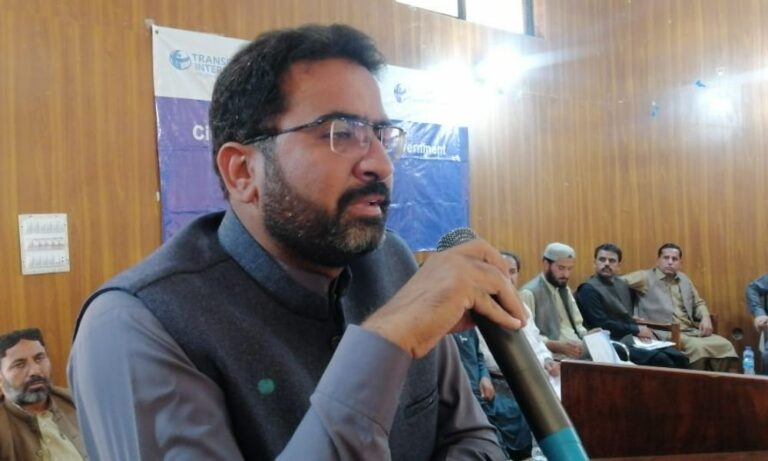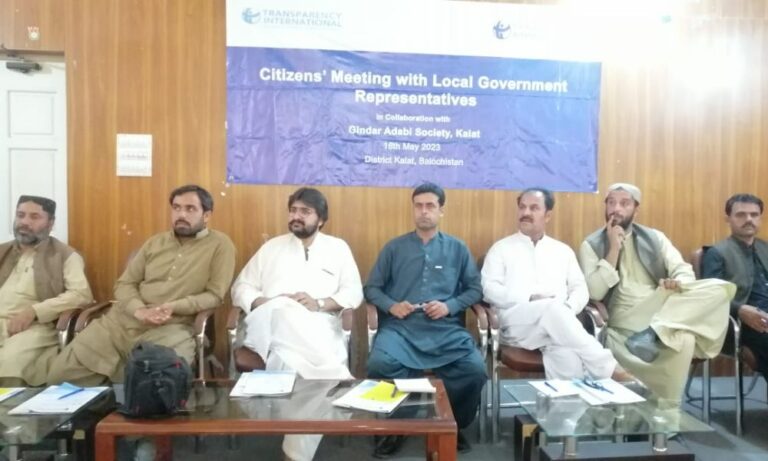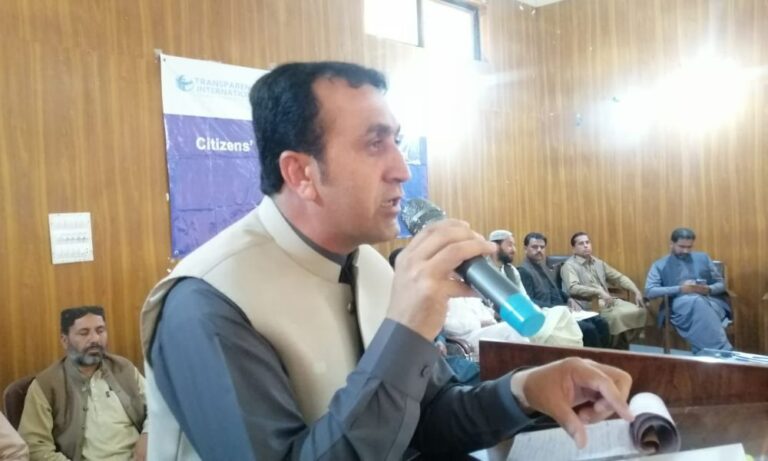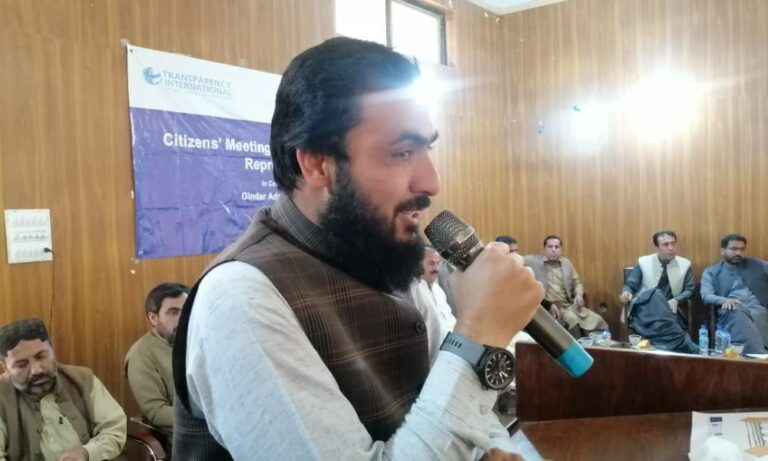- Home
- Citizens Meeting with Local Government Representatives
Citizens Meeting with Local Government Representatives
Citizens Meeting with Local Government Representatives
Venue: Town Muncipal Hall
District Kalat, Balochistan
Dated: 18-05-2023
Transparency International Pakistan, in collaboration with Gindar Adabi Society, organized a social accountability session called “Citizens’ Meeting with Local Government Representatives” at the Town Municipal Hall in Kalat, Balochistan. The session had two primary objectives. Firstly, it aimed to provide a platform for local government representatives and citizens to interact and communicate the challenges and issues they face in fulfilling their respective mandates. Secondly, it aimed to give an overview of the local government system of Balochistan to both citizens and local government representatives. The session had a total of 140 participants (130 males and 10 females) including teachers, traders, students, social workers, union council members, and journalists.
The program commenced with the recitation of the Holy Quran, followed by a welcome address by Mr. Musa Khan Mengal, President of Gindar Adabi Society. He introduced Transparency International Pakistan and its work, emphasizing its past interventions in Kalat. Mr. Musa highlighted the concept of social accountability, emphasizing that it promotes citizen participation, information sharing, and feedback mechanisms, ensuring that local representatives are aware of and responsive to the needs and concerns of the community they serve.
Master Trainer Zahoor Mehar then delivered a detailed presentation on the local government system of Balochistan, highlighting its key features. He explained that the system is designed to promote effective governance and representation at the grassroots level through elected local councils, including union councils, Tehsil councils, and District councils, each responsible for specific administrative areas. These councils facilitate citizen participation, decision-making, and service delivery, aiming to empower local communities, decentralize authority, and ensure responsiveness to the people’s needs.
Mr. Zafar Ali Shah, the secretary of UC Maliki, addressed the gathering and expressed appreciation for the local government system, emphasizing the effectiveness of direct contact between people and local representatives in providing quick response and resolution of issues, bypassing delays often encountered with provincial and federal representatives. He stressed the importance of local representatives being well-informed about their powers and responsibilities to efficiently serve the people.
Syed Nazir Harifal, the Quetta District Election Commissioner, highlighted that the local government system aims to empower the lower class by transferring powers to them, considering it not only the best system in the country but also an effective model worldwide. District Election Commissioner Sorab Abdul Muqtadar Ghazali emphasized that elected councils, chairmen, and vice-chairmen are legitimate representatives with specific powers granted to them under local government laws. Their duty is to tirelessly strive for the rights of the people in their respective ward union councils and work towards the development and prosperity of society. However, he lamented that the significance of this system often goes unnoticed, despite its evolutionary stages and the various names and powers it has held.
During the session, Abdul Baki from UC Mangochar and Shabbir Ahmed from UC Barenchna shed light on the historical context of the local government system, highlighting its emergence during the transition from monarchy and other forms of government to democracy. They acknowledged the challenges faced in addressing citizens’ concerns, attributing them to the scarcity of resources and the multitude of reported problems. They emphasized the need to improve the delegation of powers, as provincial governments hold more powers, recognizing that it takes time to fully embrace democratic values. They further advocated for minimizing the budget gap and ensuring that the local government receives its rightful share of local tax collection. They acknowledged the justifiability of people raising their voices in the 21st century when they are still grappling with basic needs, particularly in a province like Balochistan.
In the Q&A session, citizens raised various issues and problems in their areas. They inquired about the steps being taken to improve basic services like water supply, sanitation, electricity, and road infrastructure after the destruction caused in the recent flood. Citizens also questioned how to control corruption in resource allocation, and monitoring the ongoing construction projects of dams and bridges. Another issue which was particularly highlighted during Q&A, was the scarcity of drinking water and the need for more tube wells, particularly in remote areas. People have to cover a long distance to fetch water. Another issue which was raised by people is the unavailability of secondary school teachers in remote areas. Some of the citizens questioned the transparency of the allocated funds for flood victims.
Local government representatives addressed each question, acknowledging their awareness of such issues and their commitment to delivering the best possible outcomes within limited resources. Mr. Musa Khan Mengal thanked all participants, local government representatives, and Transparency International Pakistan for organizing the event. Refreshments were provided, and the event concluded on a positive note.
Moreover, the union council members learned a great deal about the local government system of Balochistan. They learned about their powers and financial matters. The participants left the session with a greater understanding of the local government system, its potential, and the importance of their active engagement. It is hoped that the session will help to create an awareness among the citizens that their voices are heard, and their concerns are addressed in a timely and efficient manner.







